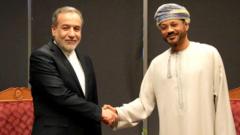The announcement of a record-breaking military budget comes as Trump faces backlash for contradicting his own campaign principles on fiscal responsibility and foreign interventionism.
Trump's $1 Trillion Military Budget Sparks Controversy Amid Peace Promises

Trump's $1 Trillion Military Budget Sparks Controversy Amid Peace Promises
President Donald Trump's unprecedented defense budget announcement raises questions about his commitment to reduced government spending.
President Donald Trump stirred debate on Monday after proposing a staggering $1 trillion military budget, shifting away from his previous commitments to reduce government size and promote global peace. This announcement was made during a press conference with Israeli Prime Minister Benjamin Netanyahu, where Trump touted the funding as unprecedented, claiming, “Nobody’s seen anything like it.”
The sizable investment in defense for the coming fiscal year is aimed at enhancing military equipment and training, as Trump argues that the current global climate necessitates a stronger military presence. “The military is something we have to build,” he stated, pointing to perceived threats from various global entities.
However, the announcement has ignited criticism, particularly from analysts who highlight the inconsistency with Trump’s prior campaign pledges focused on fiscal responsibility and a less interventionist foreign policy. Critics argue that this substantial military expenditure looks more like a continuation of past U.S. foreign policy than a transformative approach.
In defense of the budget increase, Trump’s supporters argue that the strategy of “peace through strength” is essential for ensuring national security and that this strong military posturing will deter adversaries from taking aggressive actions against the U.S. and its allies. As a result, the announcement illustrates a complex tension between governance philosophies, highlighting differing views on the role of military spending in maintaining peace and security on a global scale.
The sizable investment in defense for the coming fiscal year is aimed at enhancing military equipment and training, as Trump argues that the current global climate necessitates a stronger military presence. “The military is something we have to build,” he stated, pointing to perceived threats from various global entities.
However, the announcement has ignited criticism, particularly from analysts who highlight the inconsistency with Trump’s prior campaign pledges focused on fiscal responsibility and a less interventionist foreign policy. Critics argue that this substantial military expenditure looks more like a continuation of past U.S. foreign policy than a transformative approach.
In defense of the budget increase, Trump’s supporters argue that the strategy of “peace through strength” is essential for ensuring national security and that this strong military posturing will deter adversaries from taking aggressive actions against the U.S. and its allies. As a result, the announcement illustrates a complex tension between governance philosophies, highlighting differing views on the role of military spending in maintaining peace and security on a global scale.






















